Last Updated on July 31, 2021
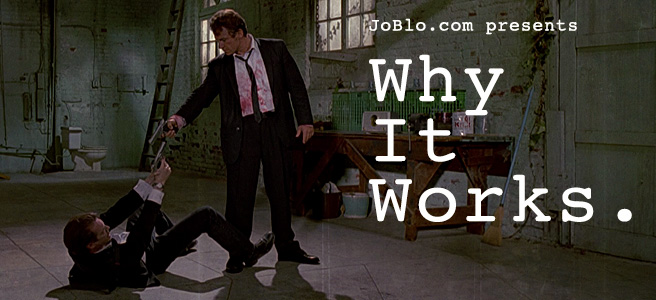 Why It Works is an ongoing column which breaks down some of the most acclaimed films in history and explores what makes them so iconic, groundbreaking, and memorable.
Why It Works is an ongoing column which breaks down some of the most acclaimed films in history and explores what makes them so iconic, groundbreaking, and memorable.
****SPOILERS AHEAD****
Reservoir Dogs: Bloody Days launched on Steam last week, and while the game was met with fairly mediocre reviews, this seemed like an appropriate time to look at Quentin Tarantino's first feature and one of the films that would launch the indie boom of the 1990s. Celebrating its 25th anniversary this year, RESERVOIR DOGS features a motley crew of bad guys, a non-linear plot, long scenes discussing action without ever showing much of it, and a violent finale which leaves us with nothing but a pile of corpses by the time the credits roll. Here's why it works:
WHY WE LIKE THE CHARACTERS:
Just over two years ago, my very first article for this site was a Why It Works on PULP FICTION, in which Tarantino uses a similar strategy to get us on board with his less-than-heroic protagonists. The opening diner scene is all we need to know who these guys are. For one, in their discussion of "Like A Virgin" and other songs, we see a bunch of regular guys sitting around shooting the shit, not a pack of smooth criminals spouting slick one-liners. Moreover, when Mr. Pink refuses to leave a tip, the other men gang up on him, showing their concern for the waitress and the meager wages she earns for a thankless job. Before we see them as criminals and killers, we see them as familiar faces with whom we can easily identify.
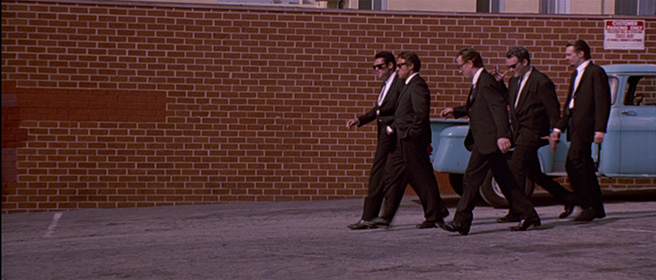 Don't be surprised if you see one of these on SWINGERS later this year…
Don't be surprised if you see one of these on SWINGERS later this year…
As the story progresses, we start to see the characters as individuals rather than a collective- particularly the three for whom we're provided backstories. On one end of the spectrum, we have Mr. Blonde, who reveals himself to be the token wildcard and the closest thing we get to a villain (this also helps us sympathize with the other characters by contrast). Fighting for the side of good is Mr. Orange, whom we discover to be an undercover cop. We don't learn much about Mr. Orange's personal morality until late in the game, but just the fact that he represents the side of good is enough for us to separate him from the rabble. Somewhere in between is Mr. White, who is both happy to live the life of a criminal but also shows a tremendous amount of compassion for Mr. Orange, going as far as risking his life to stick up for him when Joe tries to expose him as a rat.
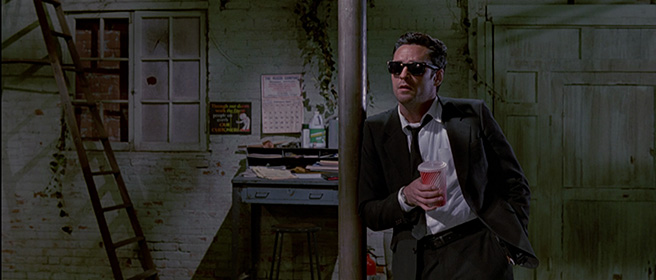 "Are you gonna bark all day, little doggie, or are you gonna bite?"
"Are you gonna bark all day, little doggie, or are you gonna bite?"
WHY WE CARE:
Where most heist movies focus on the moments leading up to the heist, RESERVOIR DOGS focuses on the aftermath. This is certainly a ballsy move, but between jumping into the action with Mr. Orange and Mr. White's bloody car ride, flashing back to a few choice chase scenes, and providing plenty of tension in the present moment, Tarantino manages to tell a story just as exciting as traditional films of the genre. One problem with heist movies is that you generally have one of the following: scenes where the characters tell you what's going to happen- and then of course the plan goes to shit- and scenes where something happens the characters never told you about, which can just leave you feeling cheated. In RESERVOIR DOGS, we instead find ourselves in a warehouse after a diamond heist with no idea what the hell is going on. The more we're fed pieces of the story, the more the tension builds for both the audience and the characters as the men have no choice but to stay holed up in a warehouse together with the suspicion that any one of them might have double-crossed the group.
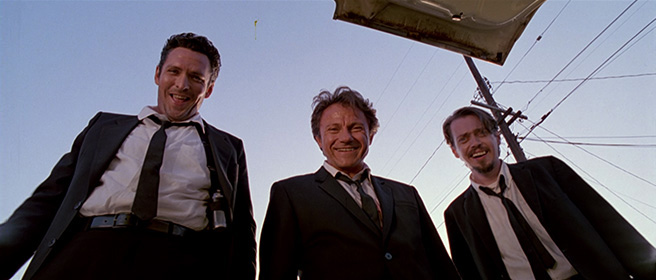 Ah, the famous trunk shot…
Ah, the famous trunk shot…
WHY WE'RE SATISFIED:
It's only an hour into the film that Mr. Orange kills the maniacal Mr. Blonde and admits to being a cop to the grateful Officer Nash. Just as we're left having no idea how he'll get out of the situation, Tarantino takes us on a 25 minute field trip to tell us the backstory of Detective Freddy "Mr. Orange" Newandyke, keeping us on the edge of our seats until we finally get back to the warehouse. In the film's final moments, we're treated to a Shakespearean standoff where Joe, convinced Mr. Orange is a rat, points a gun at him, Mr. White, convinced Orange is clean, aims his piece at Joe, and Eddie, none too pleased about his father's life being threatened, levels his weapon at Mr. White. Meanwhile, Mr. Pink finds himself a nice hidey-hole. Shots are fired, White takes a second shot at Eddie, and cleanup on aisle 5.
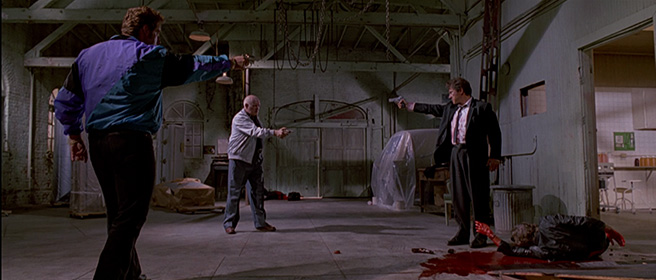 This scene had way more doves when John Woo did it in FACE/OFF.
This scene had way more doves when John Woo did it in FACE/OFF.
As Mr. Pink walks out with the diamonds only to be taken down by the cops seconds later, Mr. Orange succumbs to guilt and confesses his identity to Mr. White. Being that their shared scene at the beginning of the film is the only real moment of intimacy we see between any of the characters, Orange's confession and White's pained yowl are particularly heartbreaking. As the cops burst in, White fires a single shot, undoubtedly killing Orange, and is mowed down by the police in response. In one sense, it's a very simple ending- crime doesn't pay, bad guys get what they deserve, etc., but there's also a cathartic release of tension after living with the characters' distrust and paranoia for the duration of the film. As for Mr. Orange… I don't know. Sure, he's a "good guy," but he kills a civilian (albeit in self-defense), admits he's a cop to a criminal with a gun, and all-in-all seems to enjoy playing the part, so we're not necessary gutted to see him go down with the rest of his colleagues.
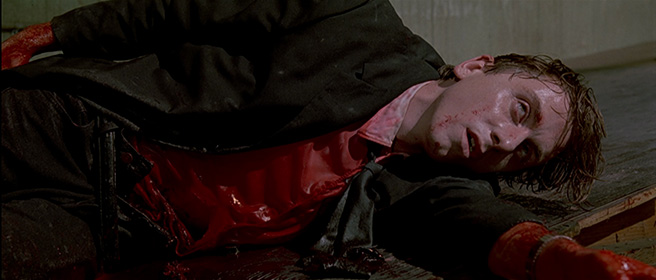 What's black and white and red all over?
What's black and white and red all over?
WHY WE REMEMBER:
Whatever you feel about Quentin Tarantino's oeuvre, there's no question he's significantly turned up the Tarantino-ness of his films since the early days. As with PULP FICTION and JACKIE BROWN, RESERVOIR DOGS lets stylization take a back seat to the film's raw grittiness, allowing for the dialogue and performances to speak for themselves. That said, the gang's matching suits, K-Billy's Super Sounds of the 70's, the non-linear storytelling, and the occasional nod to Martin Scorsese, Stanley Kubrick and other classic filmmakers keep this from being just another crime film- and initially helped Tarantino make his mark on the cinematic landscape. Similar to his directing style, Tarantino's script is fun and snappy but doesn't stray too far into the unnatural. Even then, most of the "cool" lines sound like the characters trying to be cool rather than Tarantino trying to make them cool.
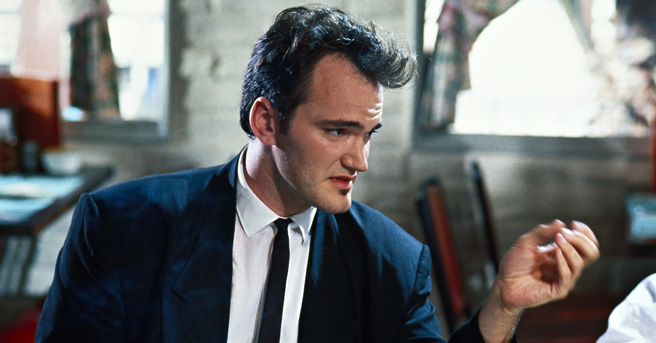 "I didn't go out of my way to do a rip-off of THE KILLING, but I did think of it as my KILLING, my take on that kind of heist movie." – Quentin Tarantino
"I didn't go out of my way to do a rip-off of THE KILLING, but I did think of it as my KILLING, my take on that kind of heist movie." – Quentin Tarantino
Speaking of the characters, Harvey Keitel, Tim Roth, Michael Madsen, Steve Buscemi, Chris Penn, Lawrence Tierney, Quentin Tarantino, Eddie Bunker, Randy Brooks, and Kirk Baltz do a hell of a job bringing them to life with organic, committed performances and delicate portrayals that keep us perpetually somewhere between loving and hating them. In many ways, RESERVOIR DOGS represents a generational passing of the torch. Tarantino will be the first to admit many of its moments are borrowed from other movies (in his words, "I didn't go to film school; I went to films"), and yet it would become an instant classic and a movie that would be copied, referenced, and celebrated for years to come.
Thoughts? What else worked for you? What didn't? Strike back below!
If you have any movies you'd like to see put under the microscope, let us know below or send me an email at [email protected].


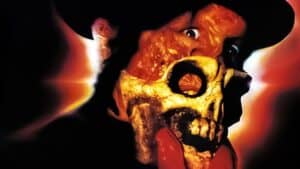
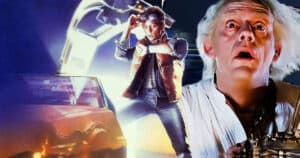

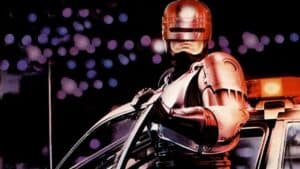
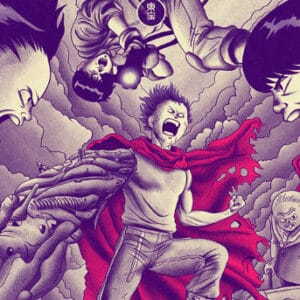

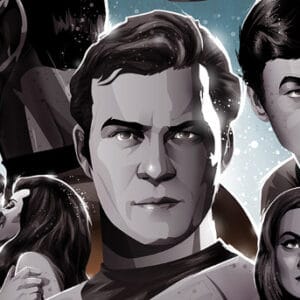
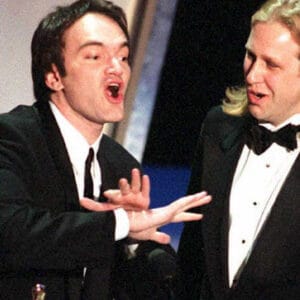
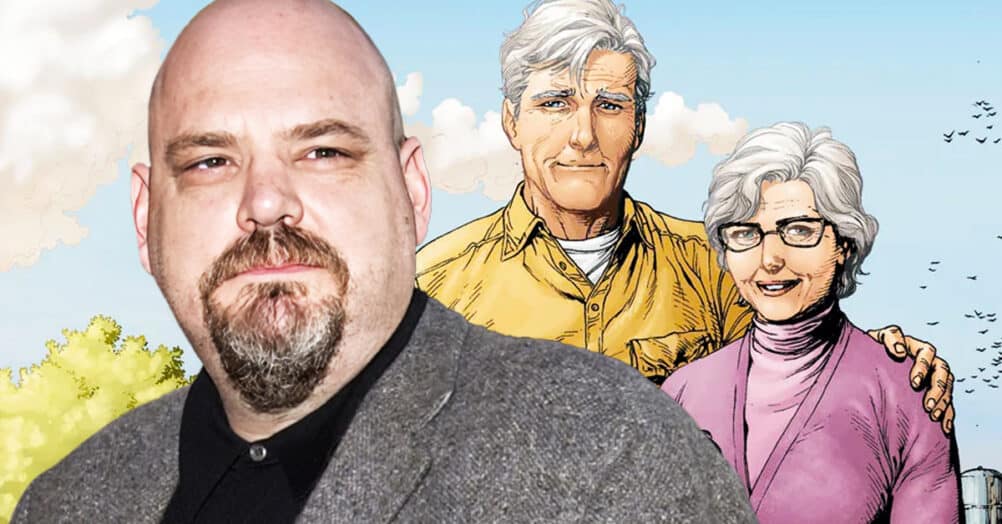
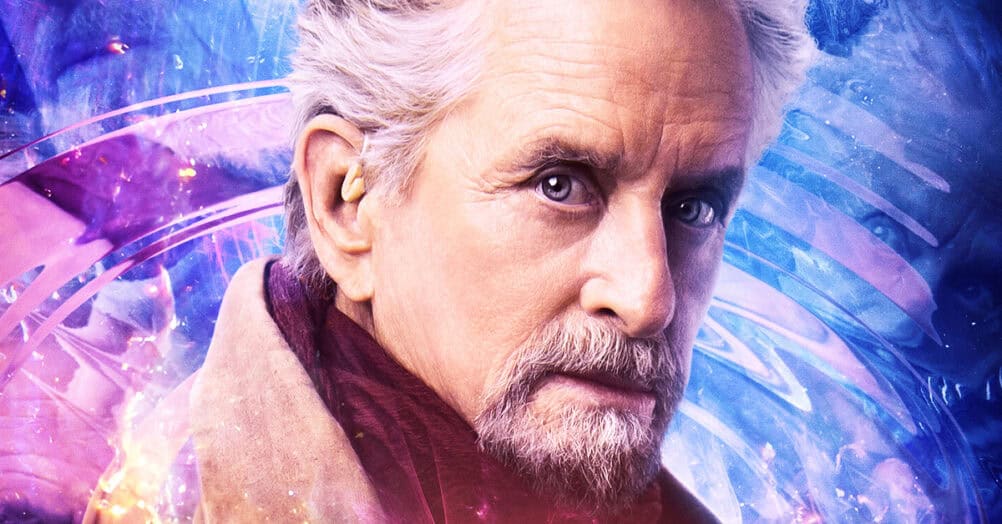
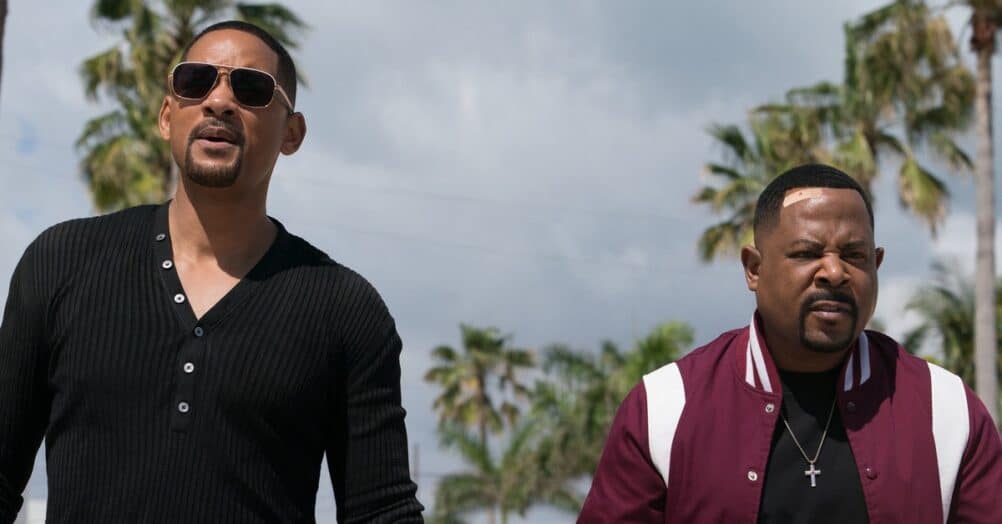
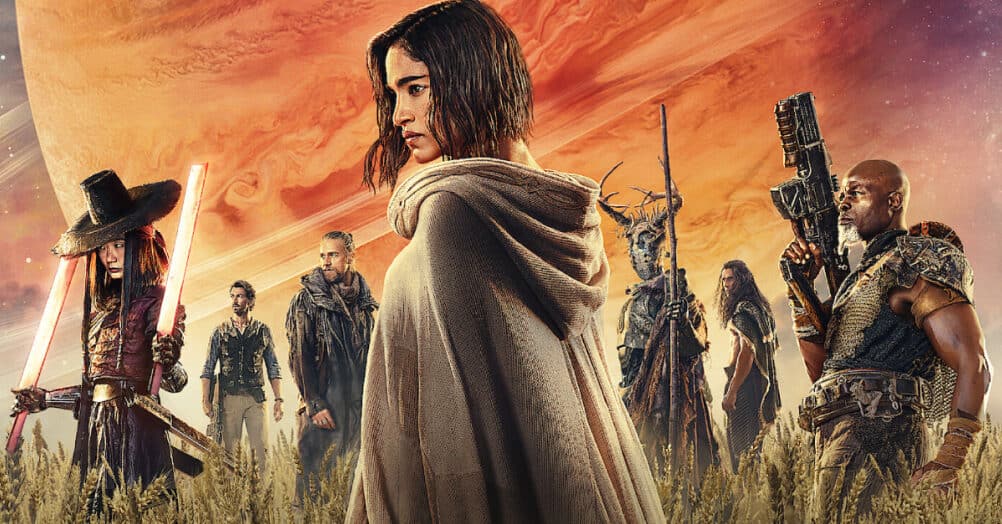
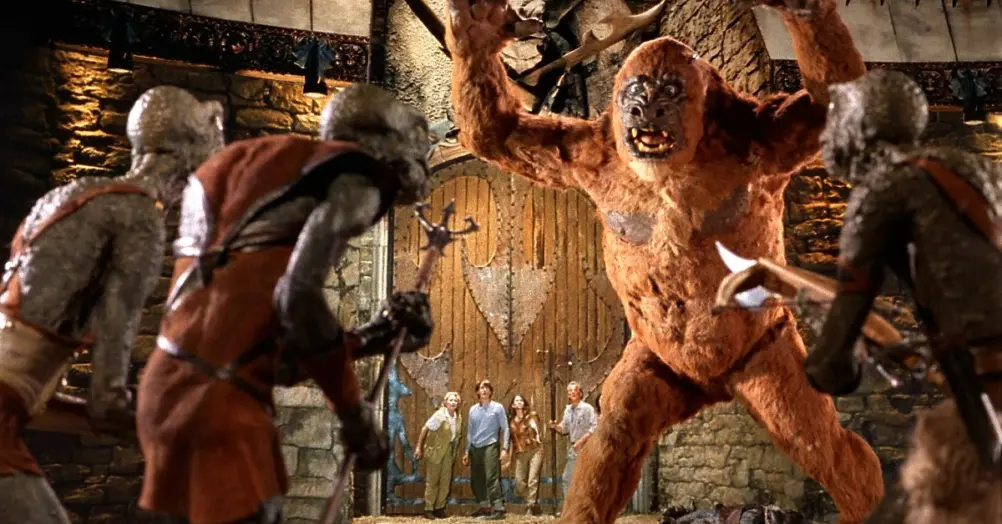
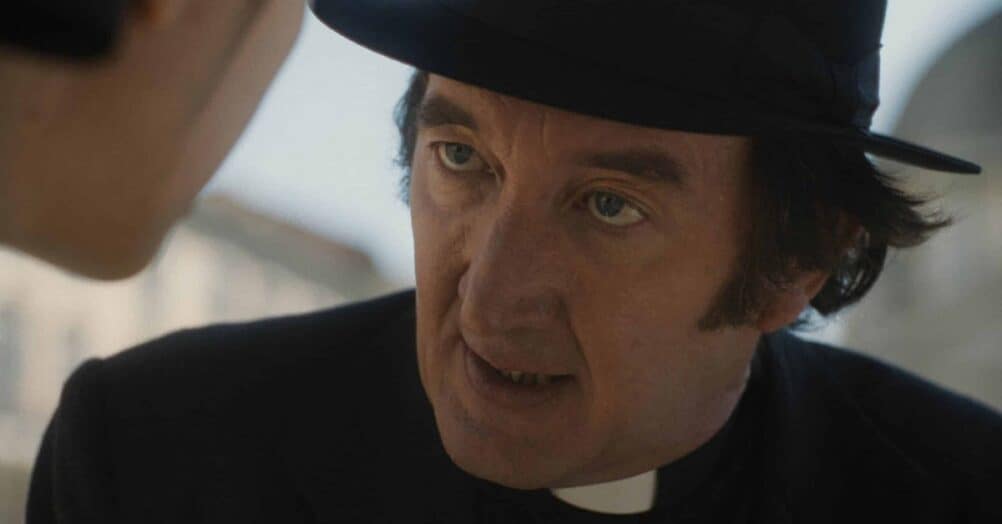
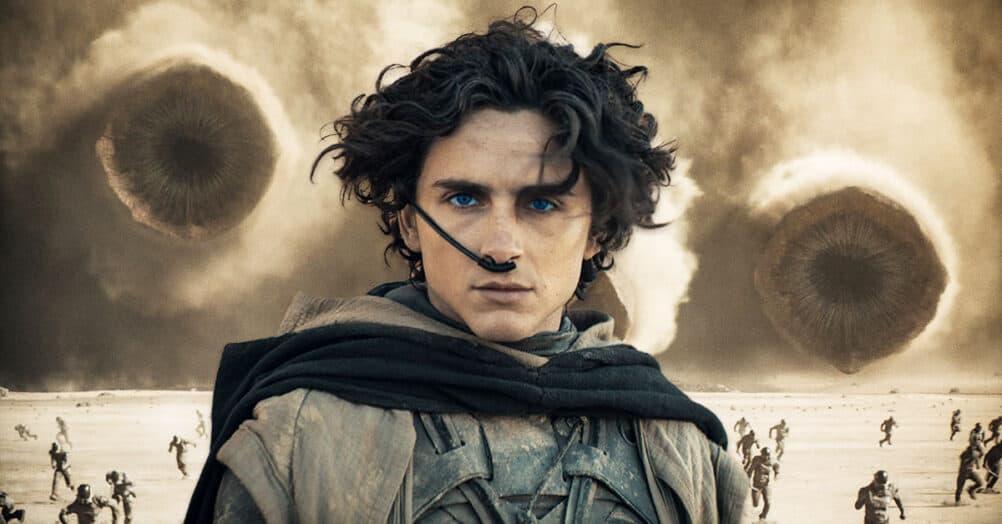

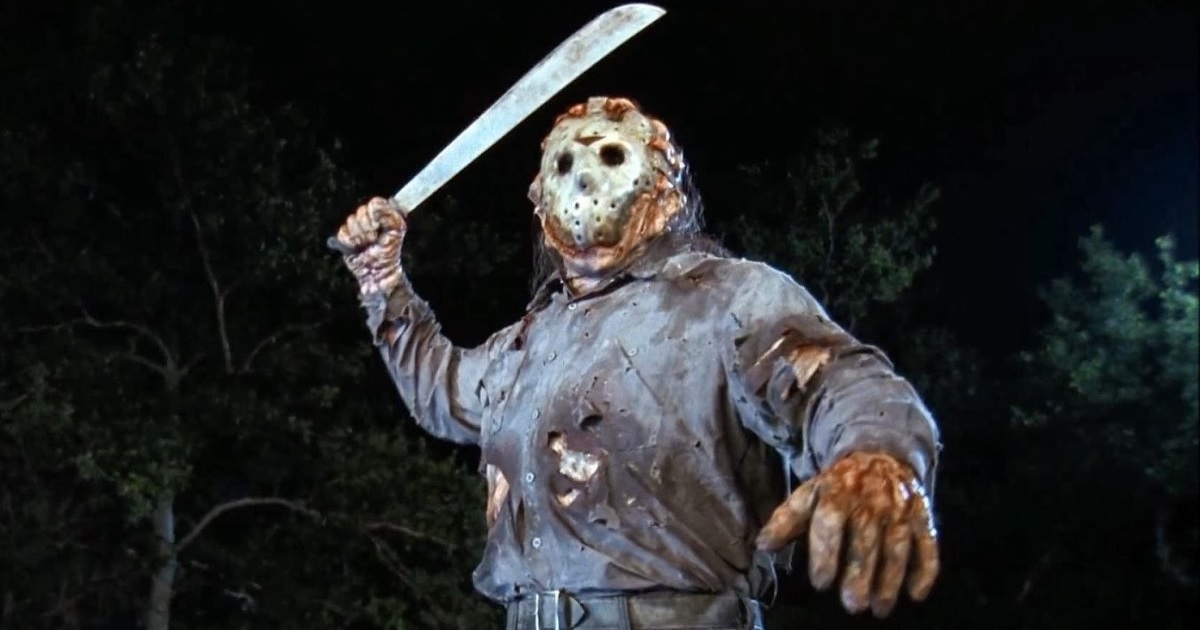
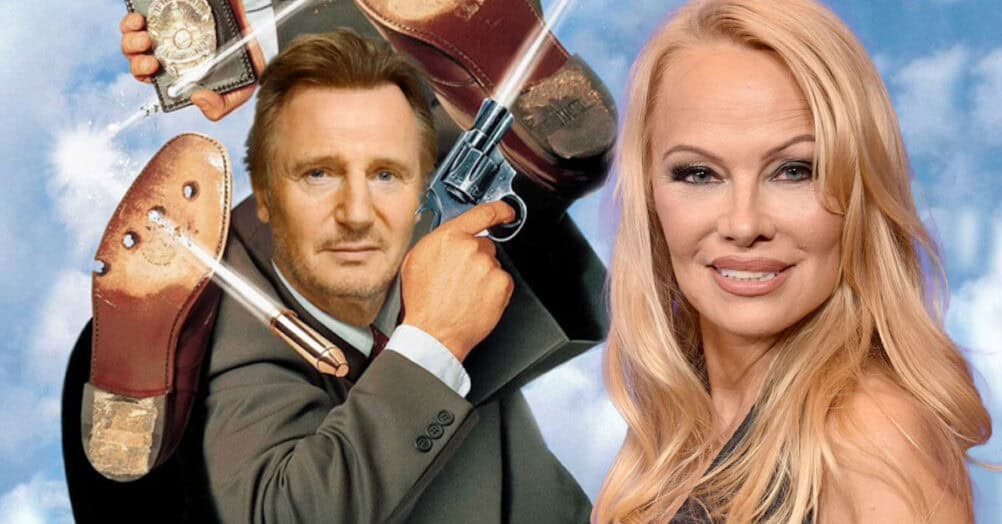
Follow the JOBLO MOVIE NETWORK
Follow us on YOUTUBE
Follow ARROW IN THE HEAD
Follow AITH on YOUTUBE